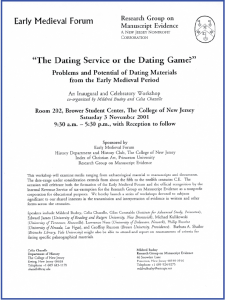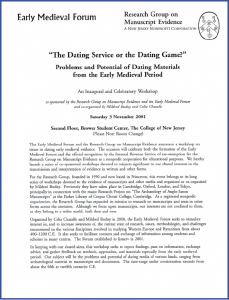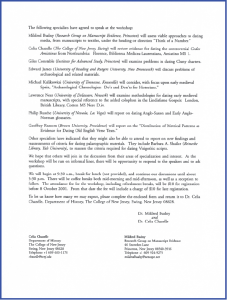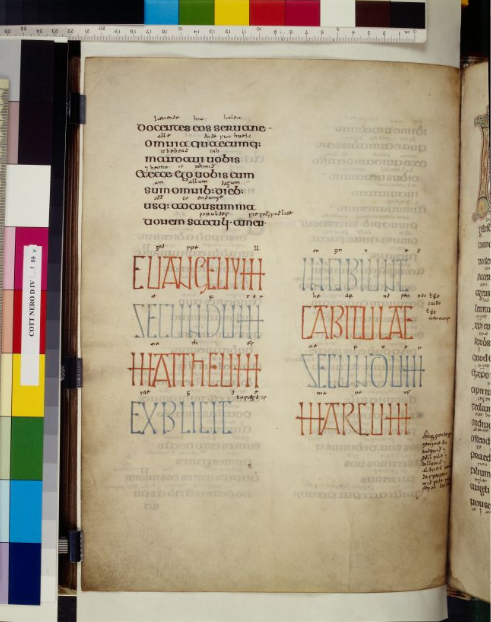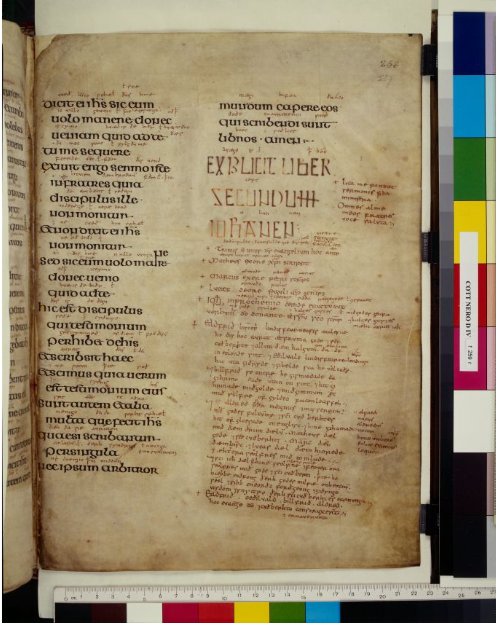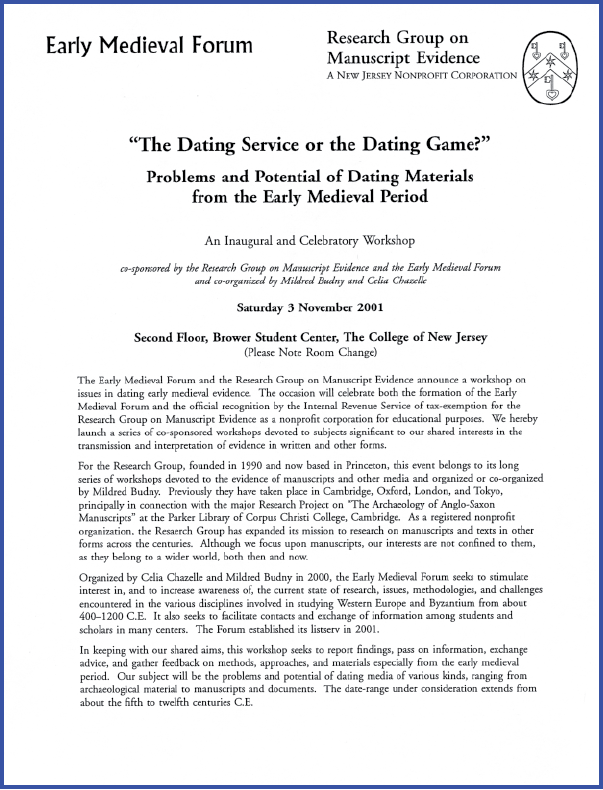2001 Inaugural Workshop on “The Dating Service or the Dating Game?”
January 1, 2014 in Conference Announcement, Events
An Inaugural Workshop for a New Series
Since 2001, the Research Group has jointly sponsored various forms of scholarly meetings, including Workshops, Colloquia, and Symposia, co-organized by Mildred Budny and held at various centers in the United States and elsewhere. Our earlier events are reported here:
Soon after completing the process of its incorporation as a nonprofit educational organization in 1999, and its official Recognition as such by the Internal Revenue Service, the Research Group on Manuscript Evidence resumed its organization of scholarly events with an “Inaugural and Celebratory Workshop” held at The College of New Jersey. Over time, as these resumed Events gathered momentum, they came to be called
[First published on our first website on *0000, with updates]
 ” ‘The Dating Service or the Dating Game?’
” ‘The Dating Service or the Dating Game?’
Problems and Potential
of Dating Materials from the Early Medieval Period”
an Inaugural and Celebratory Workshop
This event was designed to inaugurate a series of workshops and to celebrate
1) the formation of the Early Medieval Forum and
2) the recognition for the Research Group on Manuscript Evidence
of tax-exempt status as a Section 501(c)(3) nonprofit organization.
Co-organized by Celia Chazelle and co-sponsored by
- the History Department and History Club of The College of New Jersey
the Workshop was held at The College of New Jersey, Ewing, New Jersey, in November 2001.
Information about the interests, activities, and listserv appears on its website: Early Medieval Forum.
Designs & Layout
For the Workshop, the Research Group designed a new Information sign for the display of its promotional materials. For the first time, its full official name as a nonprofit educational corporation stands on its display sign.
Poster, Booking Form, and Program
For the event, the Research Group prepared, published, and circulated promotional materials in these printed forms, which may be downloaded here.
- 1-page Poster
- 1-page Booking Form
- 2-page Program with the names of the speakers and the titles and brief descriptions of the presentations.
As customary for Research Group Events and Publications, these materials are designed in accordance with our Style Manifesto, which had emerged in its 1999 version.
Aims of the Event
In keeping with the shared aims of the sponsoring organizations, this workshop sought to report findings, pass on information, exchange advice, and gather feedback on methods, approaches, and materials especially from the early medieval period. It focused principally on the problems and potential of dating media of various kinds, ranging from archaeology material to manuscripts and documents, in a date-range from about the fifth to the twelfth centuries C.E.
Speakers (in alphabetical order)
- Mildred Budny (Research Group on Manuscript Evidence, Princeton) assessed viable approaches to dating media, from manuscripts to textiles, under the heading or direction of: “Think of a Number”
- Celia Chazelle (The College of New Jersey) reviewed evidence for dating the controversial Codex Amiatinus (Florence, Biblioteca Medicea–Laurenziana, Amiatino MS 1) from Northumbria
- Giles Constable (Institute for Advanced Study, Princeton) examined problems in dating Cluny charters
- Edward James (University of Reading and Rutgers University, New Brunswick) discussed problems of archaeological and related materials
- Michael Kulikowski (University of Tennessee, Knoxville), “Archaeological Chronologies: Do’s and Don’ts for Historians”, with focus on early medieval Spain
- Lawrence Nees (University of Delaware, Newark) examined methodologies for dating early medieval manuscripts, with special reference to the added colophon in the Lindisfarne Gospels (London, British Library, Cotton MS Nero D. iv)
- Philip Rusche (University of Nevada, Las Vegas) reported on dating Anglo-Saxon and Early Anglo-Norman glossaries
- Geoffrey Russom (Brown University, Providence), “Distribution of Metrical Patterns as Evidence for Dating Old English Verse Texts”
Next we held co-organized Colloquia at both the British Museum (March 2002) and the Center for Epigraphical and Palaeographical Studies at The Ohio State University (October 2003).
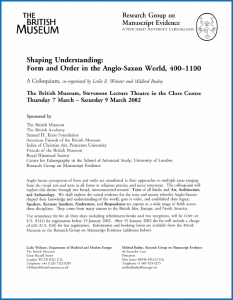 “Shaping Understanding: Form and Order in the Anglo-Saxon World, 400–1100”
“Shaping Understanding: Form and Order in the Anglo-Saxon World, 400–1100”
(The British Museum, March 2002)
Form and Order Colloquium 2002
- “Innovations for Editing Texts from Antiquity to Enlightenment”
(The Ohio State University, October 2003)
Editing Colloquium 2003
*****
Further Colloquia, Symposia, Workshops, and Seminars emerged in their course, as reported here.
See especially The New Series of Symposia and similar Events, which this Workshop inaugurated.
*****

